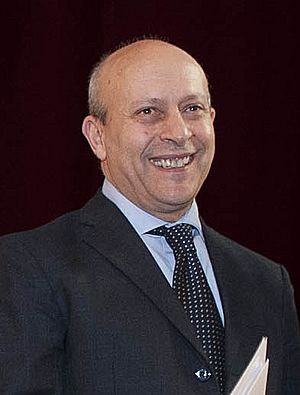José Ignacio Wert facts for kids
Quick facts for kids
José Ignacio Wert Ortega
|
|
|---|---|

Wert in 2012
|
|
| Minister of Education, Culture and Sport | |
| In office 22 December 2011 – 25 June 2015 |
|
| President | Mariano Rajoy |
| Preceded by | Ángel Gabilondo (Education) Ángeles González-Sinde (Culture) |
| Succeeded by | Íñigo Méndez de Vigo |
| Personal details | |
| Born | 18 February 1950 Madrid, Madrid, Spain |
| Political party | Independent (Formerly Partido Popular) |
José Ignacio Wert Ortega was a Spanish politician. He was born on February 18, 1950. From 2011 to 2015, he served as the Minister of Education, Culture and Sport for Spain. He was chosen for this important role by the president of Spain, Mariano Rajoy.
Contents
About José Ignacio Wert
José Ignacio Wert went to school at the Colegio Santa María del Pilar in Madrid. He worked in different public jobs before becoming a minister. For example, he helped with studies about what people watched on TV and how people felt about different topics. He also advised the Spanish Radio and Television Corporation.
His Time as Minister of Education, Culture and Sport
José Ignacio Wert became the Minister of Education, Culture and Sport on December 22, 2011. During his time as minister, he made several important changes and decisions related to schools and culture in Spain.
Changes to Education
In early 2012, Minister Wert announced plans to change how secondary education worked. He suggested reducing the number of years for compulsory secondary education. This meant that students would spend less time in these specific school years.
He also proposed adding more years to the Baccalaureate program. This is a type of education that prepares students for university. Many teachers and student groups were worried about these changes. They thought the changes might make public education more expensive for families or lead to private schools becoming more common.
New Subject in Schools
One of his decisions was to change a school subject called "Education for Citizenship." This subject taught students about their rights and duties as citizens. Some groups, especially the Catholic Church, had concerns about this subject.
Minister Wert decided to replace it with a new subject called "Civil and Constitutional Education." He said this new subject would avoid topics that caused arguments. It would focus on basic civic rules and the Spanish Constitution. This change was supported by some parents' groups. The new subject also talked about the importance of businesses in creating wealth and respecting ideas that people create, like books or music.
Education Budget Cuts and Protests
In May 2012, the government decided to reduce how much money was spent on public education and health. This was done to help Spain meet its financial goals set by the European Union. About 3.7 billion euros were cut from education.
Because of these cuts, a big protest happened on May 22, 2012. It was a general strike involving all parts of the education system, from preschools to universities. Teachers and students organized it. They were protesting against the government's decisions, saying these cuts could harm the future of public education.
Some of the changes that caused the protests included:
- More students in each classroom (for example, primary school classes went from 25 to 30 students).
- Teachers had to work more hours.
- Schools would not cover sick leave for teachers if it lasted less than 15 days.
- University fees became more expensive for students.
The day after the strike, leaders of public universities refused to attend a meeting with Minister Wert. They were protesting because the meeting's agenda did not include discussions about the higher university fees or the budget cuts affecting universities.
See also
 In Spanish: José Ignacio Wert para niños
In Spanish: José Ignacio Wert para niños
 | Anna J. Cooper |
 | Mary McLeod Bethune |
 | Lillie Mae Bradford |

